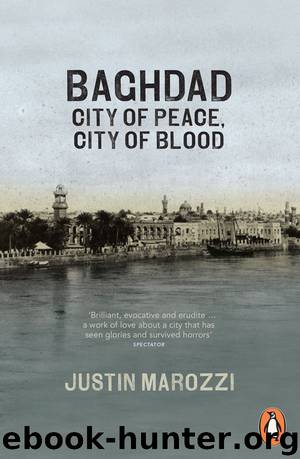Baghdad: City of Peace, City of Blood by Justin Marozzi

Author:Justin Marozzi
Language: eng
Format: mobi, azw3
ISBN: 9780141948041
Publisher: Penguin Books Ltd
Published: 2014-05-28T22:00:00+00:00
The remarkable Adila ushered in a unique and all too brief era in which women, or at least those of the royal household, were able to exercise considerable power over the life of Baghdad. Unwilling to cede such influence after Suleyman’s death in 1762, Adila devoted herself to undermining his controversial successor, the Iranian-born Ali Pasha. She spread rumours that he was a fanatical Shia, convinced the Mamluks that he was going to have them killed and whipped up a mutiny supported by her sister and brother-in-law Omar Agha, a senior military officer. Ali Pasha was reduced to the ignominy of fleeing Baghdad dressed as a woman, in which shameful disguise he was apprehended and executed. Omar, Adila’s preferred candidate, duly became pasha and ruled Baghdad until 1776.
From the time of Adila until the fall of the Mamluk Dynasty in 1831, royal women effectively occupied the centre-stage of political life in Baghdad, even if actual power was wielded more discreetly in the wings. On the death of a pasha, his wives dominated the struggle over the all-important inheritance that would help a pretender to establish his claim to the pashalik. Thus the rich wife of Omar Pasha, who governed Baghdad from 1764 until his assassination in 1776, was said to be the true force behind his rise to power; while Suleyman the Little, pasha from 1807 to 1810, was able to remain in office only thanks to his wife’s prodigious fortune. The short-lived rule of Said Pasha (1813–16) was founded on the financial support provided by his mother.
Daughters were used as a means to extend a pasha’s political network: married to the strongest or most loyal Mamluk, they bound him into the family, securing his dependence through capital. These techniques, however, were no guarantee of stability, since more often than not each mother-leader of a Mamluk household would be fighting others on behalf of her own putative pasha. From 1790 to 1831 the most important factions in Baghdad, beyond Suleyman the Great (1780–1802) and his sons’ immediate supporters, were led by former Mamluks who had married into Suleyman’s family.28 Rivalry could be fierce, often fatal. These royal women tended to occupy positions that were more stable than those of their husbands, because they were able to remain in the background, accumulating fortunes from their privileged status. And they were spared the summary executions that invariably followed political defeat for the men.
Women were also employed in more traditional roles. A curious character called Mohammed al Ajami (The Iranian) inveigled his way into the inner circle of Abdullah Pasha, Omar’s successor from 1776, by forming a musical troupe with his mother and two extremely attractive sisters. Mohammed sang, his mother played the tambourine, and his sisters danced and catered to the pasha’s carnal needs. The ambitious Iranian made no secret of his delight in procuring girls for his pasha. ‘If it hadn’t been for this honourable career, I wouldn’t have been where I am today!’ he is reported to have boasted, having risen to high office on the backs of his sisters.
Download
Baghdad: City of Peace, City of Blood by Justin Marozzi.azw3
This site does not store any files on its server. We only index and link to content provided by other sites. Please contact the content providers to delete copyright contents if any and email us, we'll remove relevant links or contents immediately.
| Africa | Americas |
| Arctic & Antarctica | Asia |
| Australia & Oceania | Europe |
| Middle East | Russia |
| United States | World |
| Ancient Civilizations | Military |
| Historical Study & Educational Resources |
Empire of the Sikhs by Patwant Singh(23086)
The Wind in My Hair by Masih Alinejad(5095)
Rise and Kill First by Ronen Bergman(4789)
The Templars by Dan Jones(4689)
The Rape of Nanking by Iris Chang(4213)
12 Strong by Doug Stanton(3550)
Blood and Sand by Alex Von Tunzelmann(3205)
Babylon's Ark by Lawrence Anthony(2679)
The History of Jihad: From Muhammad to ISIS by Spencer Robert(2628)
No Room for Small Dreams by Shimon Peres(2368)
Inside the Middle East by Avi Melamed(2357)
The Turkish Psychedelic Explosion by Daniel Spicer(2357)
Gideon's Spies: The Secret History of the Mossad by Gordon Thomas(2353)
Arabs by Eugene Rogan(2299)
The First Muslim The Story of Muhammad by Lesley Hazleton(2271)
Come, Tell Me How You Live by Mallowan Agatha Christie(2260)
Bus on Jaffa Road by Mike Kelly(2159)
1453 by Roger Crowley(2031)
Kabul 1841-42: Battle Story by Edmund Yorke(2029)
